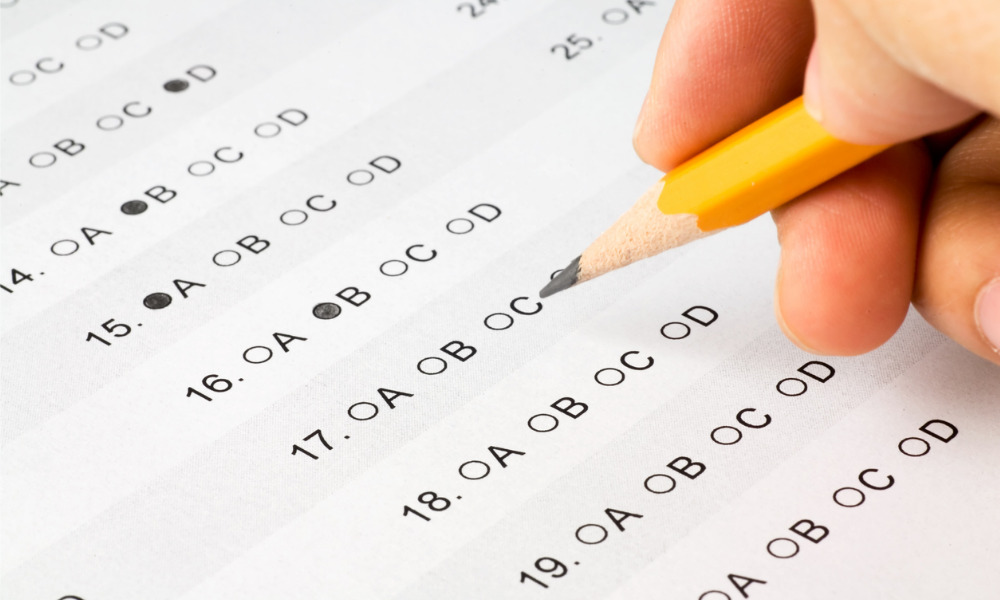
Law school deans propose a different amendment to admissions test standard

The council of the American Bar Association’s section of legal education and admissions to the bar has once more switched gear on its proposal to slash the law school admission test (LSAT) requirement, which it previously scheduled for implementation in August 2023. The decision was prompted in part by letters of various law school deans expressing their concern about the proposal.
ABA Resolution 300 sought to amend ABA Standard 503, which required all aspiring law students to take “a valid and reliable admission test” – generally the LSAT – except for up to 10% of an incoming class which a law school was allowed to admit without an LSAT. ABA Resolution 300 proposed to remove the entrance exam requirement altogether.
Last February, the ABA house of delegates rejected Resolution 300. Less than a month later, the council of the ABA section of legal education and admissions to the bar voted to take up the proposal again in August at the 2023 ABA annual meeting.
Since it was first proposed, Resolution 300 has sparked much debate on whether the proposal would support diversity in legal education or exacerbate the lack of it in the profession.
One letter signed by more than 100 law school deans suggested that law schools be allowed to admit no more than 25% of an incoming class without an entrance exam, and that the council evaluate the effectiveness of the amendment within six years of its adoption.
“We acknowledge that some administrators desire flexibility in the law school admissions process and believe that such flexibility will lead to increased diversity within law schools,” the law deans stated in the letter dated April 12. “Yet, we are concerned that a revision of Standard 503 without any limitation will lead to the opposite result and will negatively impact future students and law school diversity. Without more data, it is impossible to know what will happen. We believe that the revision we propose provides a path forward, allowing for increased flexibility while maintaining guardrails to protect students and the legal profession.”
The following day, another letter from law school deans was published supporting the 25% plan propounded in the April 12 letter and asserting that available data did not support the theory that removing the admission test requirement would encourage diversity in law schools.
Signatories of the letter included 14 women of colour who led ABA-accredited law schools in the U.S.
“We have over 30 years of data informing law schools on how the LSAT interacts with systemic racism throughout our country,” the letter dated April 13 stated. “ABA Resolution 300 would have the effect of taking away this valuable tool without providing any replacement tools. Those of us committed to antiracist admissions recognize the limits – and value – of the LSAT, and we have decades worth of data on which to base these judgments. Advocates for ABA Resolution 300 argue that law schools can and will continue to mandate the exam, but this is at best naïve. Because law school applicants apply to many law schools, and schools compete for top applicants, all but the most selective law schools will effectively be forced into making the test optional as regional and national competitors go test optional.”
The letter called for further study for “a data-informed policy regarding the requirement for a law school admissions test”.
Under ABA rules, the house of delegates may be asked to concur with proposed revisions to law school accreditation standards up to two times, although the council of the ABA section of legal education and admissions to the bar ultimately decides all matters related to law school education.
Commenting on the council’s decision to once again hit pause on the implementation of Resolution 300, ABA accreditation and legal education managing director Bill Adams said that the proposal was an acknowledgment that the current system was not necessarily the best one, and that different policies and practices might better determine who could succeed in law school.
“Although the council believes that the proposed amendments to Standards 501 and 503 represent the correct approach to ensure that schools are permitted flexibility to innovate with their admissions policies, it wants to be sensitive and responsive to the concerns raised by law school deans and other stakeholders,” Adams said. “The pause announced today will allow the council to evaluate these concerns as it continues to determine what is best for both the law schools and their applicants.”
The Law School Admission Council, the body responsible for the LSAT, welcomed the ABA council’s latest decision and expressed its readiness to assist the council in exploring “alternative approaches to help promote access and opportunity in law school admission” in an email to the ABA Journal.
Apart from the LSAT, graduate record exams (GRE) are also used as admission tests.